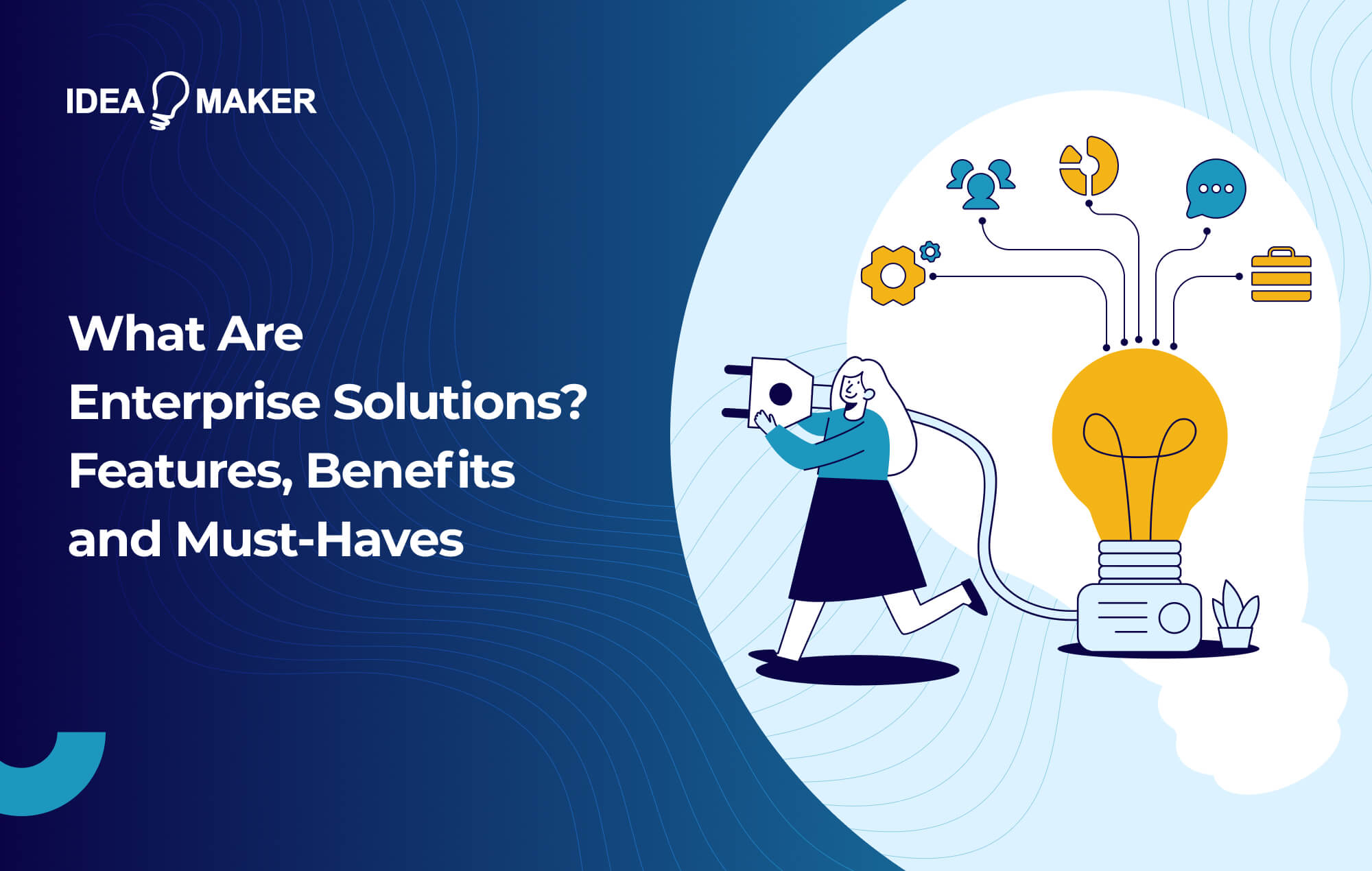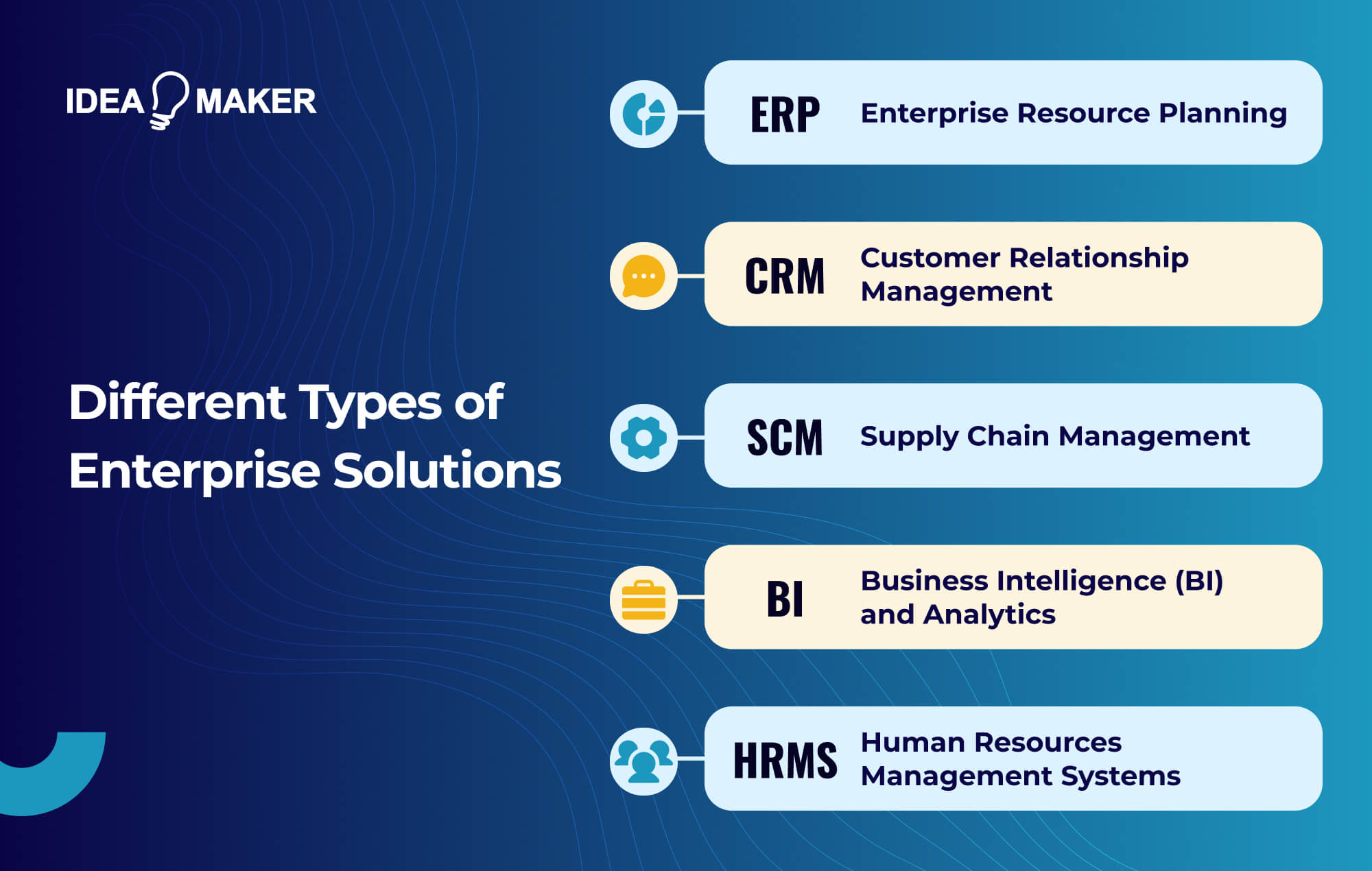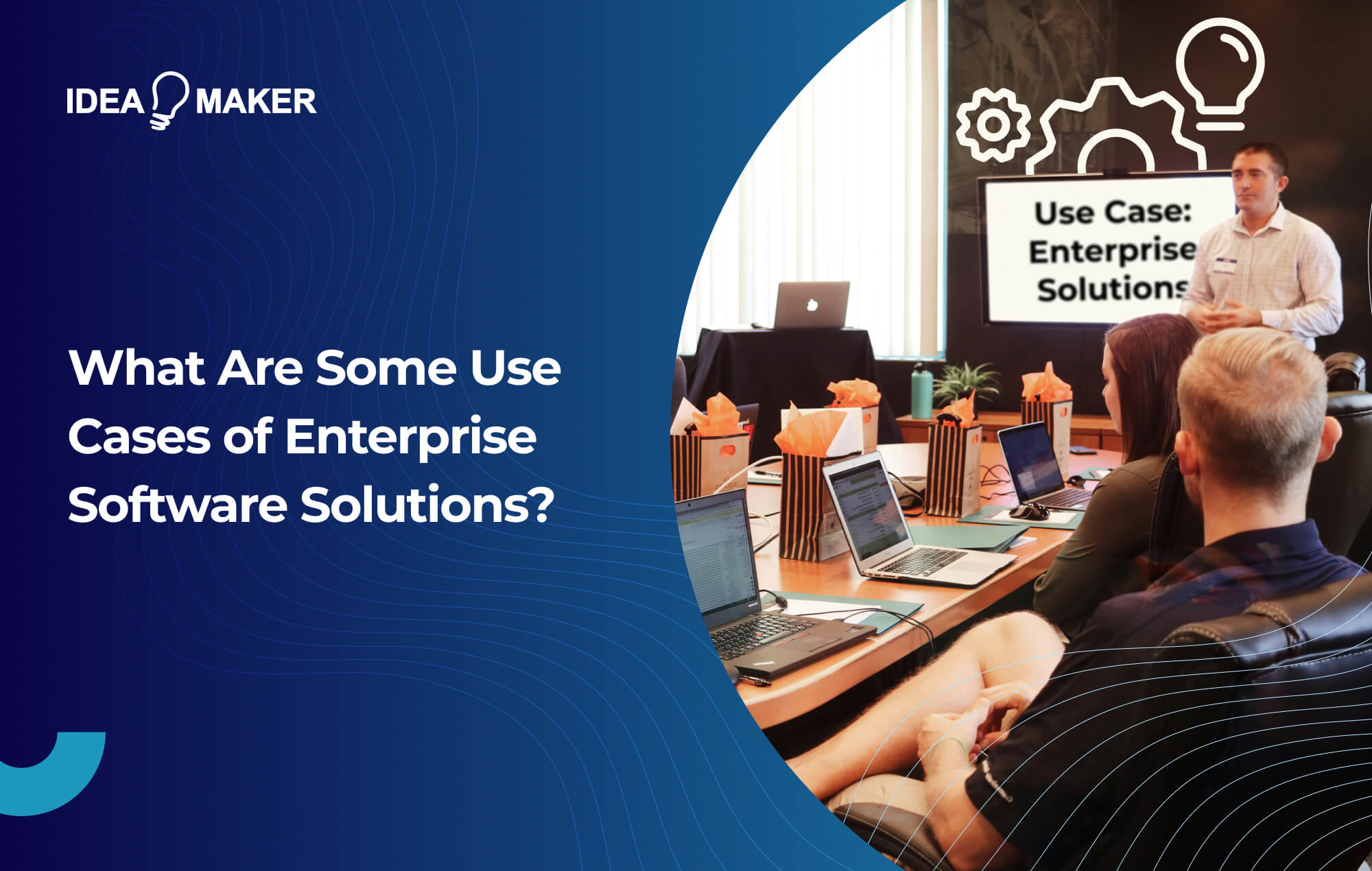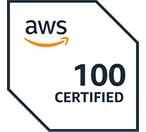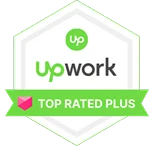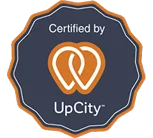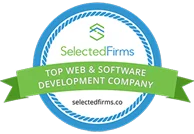Table of Contents
Enterprise software solutions are increasingly common, if not the status quo, of doing business in 2024. This is thanks to the high level of advantages enterprise software affords businesses. From better data analysis to tailor-made functionality, enterprise software is an essential part of running a successful company in today’s economic climate.
However, implementing enterprise software is often fraught with challenges such as development costs, finding the right development partner, or adhering to industry regulations. Overcoming these challenges starts with gaining a detailed understanding of enterprise software and what to expect in terms of features and benefits.
At Idea Maker, we’re here to give you a helping hand in all your software development needs.
What Are Enterprise Solutions?
Enterprise solutions offer your business a holistic approach to software by allowing you to integrate multiple facets of digital operations within one system. For example, integrating an enterprise system into your business may mean that you don’t need separate software for scheduling and CRM. Essentially, enterprise solutions solve the typical software challenges associated with your growing businesses by offering you perfectly tailored functionality.
The use of enterprise-level software started in the 1960’s when companies developed mainframe computers to automate simple business processes such as data management. Since then, they have developed from server-side management to AI- integrated business tools. Now, in 2024, enterprise solutions have developed to such an extent that they are considered to be essential for gaining a competitive advantage in the current economic climate.
Different Types of Enterprise Solutions
There are several types of enterprise solutions available, each with different purposes and benefits. Understanding the available solutions will help you determine which type of enterprise software suits your business’s needs best. For example, while you may benefit from human resource software as a construction company, you’d likely benefit more from investing in supply chain management software.
Below is a non-exhaustive list of common enterprise software types:
- Enterprise Resource Planning (ERP): Enterprise Resource Planning (ERP) allows your business to manage day-to-day tasks and resources, from accounting to procurement. Popular ERP systems include Sage and Capterra. While ERP systems are popular among all types of businesses, 8.7% of ERP users are distribution companies.
- Customer Relationship Management (CRM): Customer Relationship Management (CRM) software allows your business to take a holistic approach to customer management by centralizing customer interactions. This helps to streamline customer management operations.
- Supply Chain Management (SCM): Supply Chain Management (SCM) software helps businesses optimize the flow of goods and resources as related to their products or services. For example, while SCM can help your business to manage your raw material order process more efficiently, it can also help you to manage your financial operations with greater accuracy.
- Business Intelligence (BI) and Analytics: Business Intelligence (BI) and analytics applications allow your business to better process, visualize, present, and understand your data. This leads to more effective interpretations of your data, such as historical sales, helping your businesses to make data-driven decisions.
- Human Resources Management Systems (HRMS): HRM systems can help your business to keep on top of your human resources by providing essential functionality, from resume categorization to dispute mitigation tools.
The above solutions offer different types of businesses operating in a variety of industries access to powerful software. By adopting an appropriate form of enterprise software for your business, you too can take advantage of the benefits covered in the following section.
How Does Enterprise Software Help Your Business?
The enterprise software industry was valued at over $466 billion in 2020. Four years on, enterprise level applications are a cornerstone of all successful businesses. If you’re still not convinced as to the benefits of enterprise software, below are the top advantages of implementing an enterprise application into your business.
- Better Data Analysis: Enterprise software can improve your business’s data analytics and reporting capabilities. By bringing you bespoke tools made to fit your unique datasets and requirements, enterprise software gives you a convenient and effective way to process data. For example, by user BI software, as discussed in the previous section, you can visualize data instead of looking through raw information, making it easy to understand and act upon.
- Increased Productivity: By leveraging the power of enterprise applications, your business can increase your productivity. The use of automation in enterprise software can increase employee efficiency by 41%. This is due to the powerful functionality enterprise applications afford, from automated social media scheduling to better task management with clear communication avenues.
- Enhance Cost Efficiency: By increasing your business’s productivity, you are likely to also enhance your cost efficiency. As your team is able to produce more work at a quicker pace, more can be completed in a short time, making your labor cost-effective. For example, instead of a project taking six months, with enterprise software, it could take three.
- Enhanced Security: Off-the-shelf software solutions may provide some of the functionality you need, but not only do they lack bespoke functionality, they also lack security. Enterprise applications made specifically for your business offer a highly secure and close experience, reducing the chances of hackers and data leaks.
- Tailor-Made Functionality: Custom enterprise applications come with functionality tailor-made to your business’s requirements. This means that no matter how niche your business, you can enjoy the features you need.
While using a pre-made enterprise solution will provide some of the above benefits, we can clearly see that the real advantages come with custom built enterprise software tailored specifically to your business’s needs.
What Are Some Use Cases of Enterprise Software Solutions?
Businesses use enterprise software solutions in many different ways to elevate and streamline their work flow.
- Enhancing Retail Customer Experience: Enterprise tools like CRM and BI systems have the potential to greatly enhance your retail customer experience. This is achieved by gathering customer data and presenting them with personalized marketing based on collected information through your enterprise software. BI systems may also help you to optimize inventory management with automatic stock monitoring and ordering based on live demand. Ultimately, enterprise applications lead to increased sales, improved customer service, and enhanced customer loyalty in a retail setting.
- Streamlining Healthcare Operations: Enterprise solutions also have a place in streamlining healthcare operations. Patientrecords management, streamlining administrative processes, and ensuring compliance with health regulations can all be managed by ERP and HRM systems. In fact, ERP applications are so effective in optimizing healthcare operations that the healthcare ERP industry is expected to reach a worth of $10.04 billion by 2030.
- Financial Services Compliance and Risk Management: One type of enterprise software we didn’t discuss in the previous section is Governance, Risk, and Compliance (GRC) systems. Financial service providers use GRC systems to effectively align their business goals with their IT teams. Essentially, GRC applications could allow your business to ensure you adhere to industry standards and regulations, minimizing risks such as legal issues and sensitive data protection.
- Manufacturing Efficiency and Supply Chain Optimization: A high proportion of enterprise application users fall under the manufacturing industry. This is because integrating ERP and SCM solutions in manufacturing can optimize your production planning, inventory management, and logistics, reduces costs and improves market responsiveness.
- Technology Startups Scaling Operations: Technology startups can use enterprise applications to enable them to scale up their operations as they grow using tools such as ERPs and CRMs. This means you can automate administrative tasks resulting in no need to hire additional administrative staff to meet your demand as your business grows. Different enterprise applications can be combined by your small business or bespoke applications can be built enabling a holistic approach to your operations.
Uses of enterprise applications is not, of course, limited to the above. There are many more ways that enterprise software can be utilized to improve your business performance. No matter how niche your problem, when working with the right enterprise software developers, you can find a software solution.
Implementation Challenges and Considerations
While enterprise solutions come with a multitude of benefits for your business, there can be some challenges involved when implementing enterprise systems. It is therefore good practice to understand the difficulties you may face during enterprise software implementation so that you can be prepared and take precautions accordingly.
Idea Maker has information on the top software development risks and how to mitigate them which you may find helpful to read. However, having considered the risks involved, it is generally recognised that the benefits of enterprise applications outweigh the challenges.
Here are some challenges that you should consider:
- High Costs and Budget Overruns: Your initial investment in enterprise software can prove expensive. This is especially true when investing in bespoke enterprise software, putting your project budget at risk. However, when you consider the benefits of enterprise applications, it’s not only worth the reward, but likely that you will make your losses back in productivity.
- Change Management and Employee Training: Implementing new software into your business’s workflow presents the challenge of change management and employee training. For example, long-standing employees used to the status-quo of operations may find it hard to adjust to new changes. As a result, you should provide ample training to ensure individuals are comfortable with your new software.
- Integration WithExisting Systems: When implementing new enterprise software with your existing systems such as legacy databases and hardware, it’s not uncommon to encounter compatibility issues. However, this issue can be mitigated by talking with your developer pre-built about your compatibility requirements. This way, your new software can be developed with legacy compatibility in mind.
- Finding the Right Vendor: When developing your enterprise software, it’s important to work with the right development team, otherwise you could end up with an inferior product. To avoid this, when searching for a software development agency, you should follow these nearshore development hiring tips.
By overcoming the above challenges, you can ensure that your enterprise software development and implementation is both smooth and fruitful.
Idea Maker Can Help You Develop Enterprise Solutions
If you’re looking to develop your own bespoke enterprise software to elevate your business, then you’re in the right place. At Idea Maker, we have a team of expert software developers dedicated to making your software a success. What’s more, our experience helps to mitigate the common challenges associated with enterprise software. In other words, you’re in safe hands with our team. Schedule a free consultation with us today to learn more.
